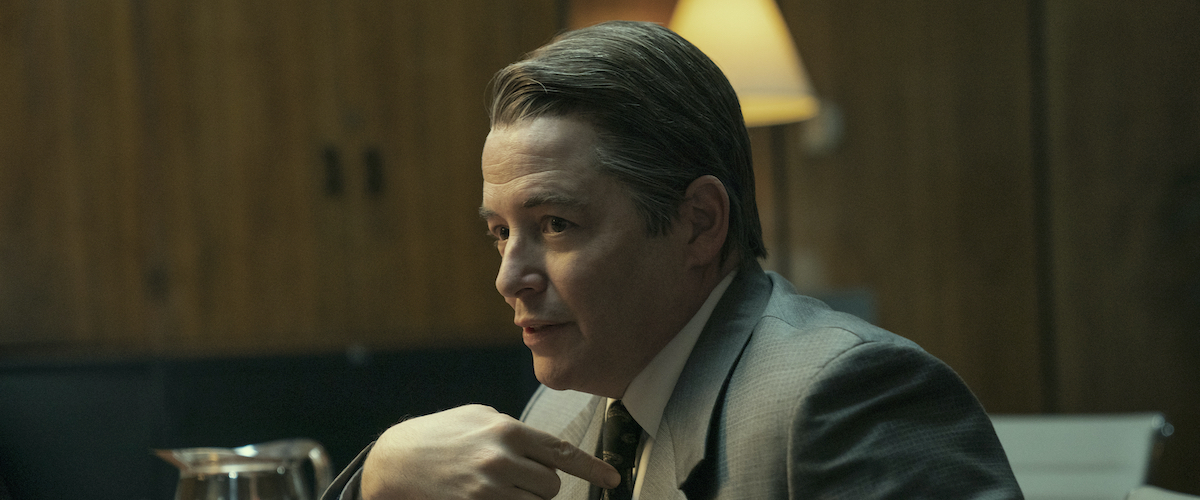
Director Peter Berg approaches Netflix’s six-episode “Painkiller” with an almost frantic style. There’s an urgency here in his telling of the origin of the opioid crisis in this country that’s admirable given the damage still being caused by Purdue Pharma, but ultimately shallow. Every episode of the series opens with shots of loved ones of people whose addiction led to their deaths in which they read the boilerplate “fictionalized” disclaimer and then pay homage to “what wasn’t fictionalized” in their life. It’s an effective reminder of the truth at the core of what “Painkiller” seeks to unpack—how greed destroyed lives—but the thin characters, aggressive filmmaking choices, and complete lack of subtlety mean that every episode fails to find the right tone for its heartbreaking overtures.
“Painkiller,” developed by Micah Fitzerman-Blue and Noah Harpster (co-writers of “A Beautiful Day in the Neighborhood”) from a New Yorker article by Patrick Radden Keefe and Barry Meier’s Pain Killer: An Empire of Deceit and the Origin of America’s Opioid Epidemic, moves down four intertwining tracks. The central one belongs to U.S. Attorney’s Office investigator Edie Flowers (an appropriately enraged Uzo Aduba), who is being interviewed by a law firm planning a civil suit against Purdue Pharma, the manufacturer of OxyContin. She basically narrates the show that follows, telling the story of how pain medication forever altered the American landscape.
Of course, this means Richard Sackler (Matthew Broderick), the Dr. Frankenstein of this monster, has to be a major character, along with his cadre of creeps, including brother Raymond (Sam Anderson) and the other suits who placed profit over caution. Broderick’s take on Sackler is similar (but less effective) to Michael Stuhlbarg's in “Dopesick,” the award-winning Hulu series that told a similar tale—a kind of sociopathic disengagement with the world. A few flashbacks reveal an abusive father for Richard, and it’s almost implied that that trauma broke him. If there’s a fire in the eyes of Aduba, there’s nothing but ice in Broderick’s.
A battle of wills between Edie and the Sacklers might have been enough for a feature film version of “Painkiller,” but this is a Netflix mini-series—so we need two more. The better of the pair is the “case study” arc of Glen Kryger (Taylor Kitsch), a mechanic who suffers a brutal accident in the premiere that leads to his addiction to OxyContin. Kitsch, an underrated actor in general, does good work here, but it’s ultimately a vein of the series that's too thin. It’s admirable to highlight the human cost of Richard Sackler’s decisions on so many average people that he never even considered. Still, the rest of “Painkiller” is so frenetic that the Kryger material feels exploitative and manipulative. Because of Kitsch and Carolina Batrczak’s work as his wife, parts of the Kryger arc are undeniably moving. But it's too predictably manipulative in its writing, like watching a slow-motion car crash.
Berg uses a totally different filmmaking style with Britt (Dina Shihabi) and Shannon (a promising West Duchovny, who seems like she could have handled more challenging material), a pair of Purdue Pharma salespeople who discover there’s a lot of money to be made in pushing drugs on smalltown doctors. Shihabi’s Britt is already a shark when we meet her, and she’s playing to the back seats, sketching her character like someone who never realized “The Wolf of Wall Street” was about a bad dude. Duchovny gets a little more subtlety as the new girl who will obviously learn the hard way that she’s part of a corrupt system, but this arc lacks subtlety at every turn. It’s the kind of show that drops people partying to Bow Wow Wow's “I Want Candy” at a Purdue Pharma corporate event, one episode after actually using Iggy Pop’s “Candy” on the soundtrack. Get it? The drugs are like candy.
It feels like the pitch for “Painkiller” was “The Big Short” for the opioid crisis, but that near-satirical tone is almost impossible to maintain for six hours across multiple character arcs, some of which never intersect. “This isn’t just about a pill that killed a lot of people,” says Edie. “It’s bigger than that.” She’s speaking for the filmmakers, who center their intention to tell the “bigger" story in every episode, but too often forget the “people.”
Now playing on Netflix.
Brian Tallerico is the Managing Editor of RogerEbert.com, and also covers television, film, Blu-ray, and video games. He is also a writer for Vulture, The Playlist, The New York Times, and GQ, and the President of the Chicago Film Critics Association.







Uzo Aduba as Edie Flowers
Matthew Broderick as Richard Sackler
Taylor Kitsch as Glen Kryger
Dina Shihabi as Britt Hufford
West Duchovny as Shannon Schaeffer
John Rothman as Mortimer Sackler
Clark Gregg as Arthur Sackler, Sr.